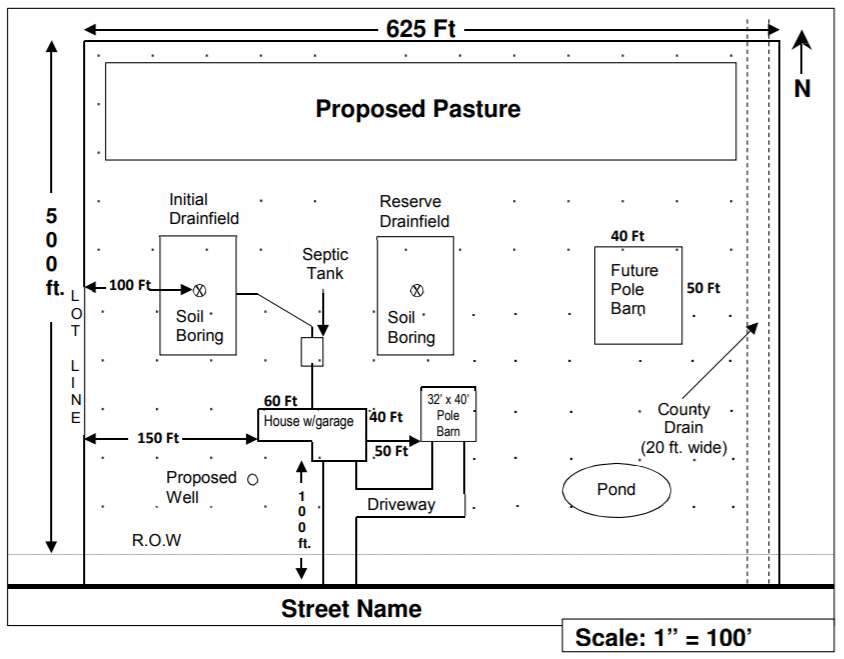This guide will walk you through getting the necessary approvals and drafting a site plan for obtaining a permit to drill a well.

Residential Well Drilling Site Plan Example
Water well costs are included for site evaluations, permits, drilling and connecting the well to a home or building. There’s a table of costs at the end of the guide.
Application for a Well: County or State?
An application must first be filed. If it is approved, you’ll be allowed a permit.
In parts of the country, often where ground water is plentiful, your county government is the place to apply for a well drilling permit. Where water is scarce, application to the state may be required.
For example, the Arizona Department of Water Resources, “regulates all groundwater wells in Arizona. Prior to drilling a new well, or deepening or modifying an existing well, a person must file a Notice of Intent to Drill with the Department.”
As you’d expect, there’s an application fee of $100 or $150 based on the proposed well’s location. In Arizona, your local office might require an additional fee.
Check your county’s Building Department or Health Department website or office to discover whether the well permit process begins at the county or state level. Even if you must apply to the state, the county office should handle the paperwork required.
Gathering Information for the Application
This Application for a Well Permit from Trinity County, CA shows the type of information you might be expected to provide. Others, like this one from Solano County, CA include contractor information about workers’ compensation and certification of code compliance. In such cases, it is best to have the well drilling contractor apply for the well permit.
Here’s an overview of where to find the required information:
Applicant/property owner information (name, address, contact information)
Property address (existing homes only)
Parcel number/property ID (found on tax bills or on your county’s website or office under register of deeds, property taxes or similar)
Legal description (more commonly required in rural areas – found where parcel ID is found)
Legal survey (only rarely required. Found in closing documents or possibly on file at your county offices, though a survey is not a public record)
Well contractor (name and contact information)
Proposed well information (size, casing type, drilling method, expected depth, etc., available from your well contractor)
Site plan (if one exists, it might be in closing documents. See the following two sections if you don’t have one)
What are Common Site Plan Requirements for Drilling a Water Well?
The site plan shows officials what is currently on the property and where the proposed well will be drilled.
Some of the key features of a site plan for a water well include the location of the:
- Proposed well
- Home or building the well will serve
- Driveway
- Septic tank, drain field and system pipes
- Bodies of water
- Road(s)
- Scale of the site plan such as 1” = 50 feet
Regulations require the well to be minimum distances from the septic system, the road and bodies of water. The site plan shows that these requirements have been met.
This application for Kent County includes a sample site plan with the necessary information.
Having a Site Plan Produced: $100 or $1,000?
Site plans are very expensive when produced by civil engineers. Cost can surpass $1,000.
A more affordable option is to use an online site plan specialist like 24hplans. Our site plans are produced by a team of professional architects and drafters for results that are extremely accurate.
The only difference is price – about $100 to $150 from 24hplans for the type of basic site plan required for a well application.
Our site plans are used throughout the country for application approval.
Getting a Well Permit
When your application is approved, you’ll be issued a permit to drill the well. Well permits range in cost from about $350 to more than $700. They include at least two inspections to ensure the well is properly drilled, capped and connected to the water system of the home or building.
As part of the cost, the water will be tested to determine whether it is safe to drink. You’ll receive a report about mineral content of the water and any contaminants present.
Well Drilling Cost
The cost of a well gets higher as the well gets deeper and as the earth gets harder. Where ground is soft and water can be reached in less than 200 feet, a cost of $4,500 to $6,500 is average.
Where wells are 500+ feet deep and the soil is rocky, wells cost $14,000 to $20,000 or more. Most wells cost $6,000 to $9,000.
| Project Steps | Cost |
| Well application | $100 to $200 |
| Site plan | $100 to $1,000+ |
| Well permit | $350 to $700+ |
| Well drilling & connection | $4,000 to $20,000 |
Well cost per foot ranges from about $22 to about $30. Neighbors, your well contractor and officials where you get the well application might be able to tell you what to expect in terms of depth and total cost.
24hplans is here to help. Contact us today at 347-708-0105 or use our convenient Chat option. Or order a site plan, and we’ll deliver a professional product that will meet the requirements for site plans in your county and state.
Note: Here’s how we can help: 24hplans has team of highly-trained, professional architects and drafters who can prepare any kind of site plan in the shortest amount of time possible, so that you can easily obtain that building permit and get on with your project. Use the promotion code: 24hplans-20off to get a 20% discount off any package. — Please note this is a limited time offer, exclusive to the readers of our blog. This offer is not being advertised anywhere else.


Leave A Comment